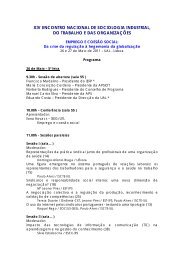Web-based Learning Solutions for Communities of Practice
Web-based Learning Solutions for Communities of Practice
Web-based Learning Solutions for Communities of Practice
Create successful ePaper yourself
Turn your PDF publications into a flip-book with our unique Google optimized e-Paper software.
community <strong>of</strong> practice members. Facilitation <strong>of</strong><br />
the CoPs is shared with other government agencies.<br />
29<br />
As mentioned be<strong>for</strong>e, 30 the Australian CIO<br />
Forum is an alternative version <strong>of</strong> the ITPF. 31<br />
On the <strong>Web</strong> page <strong>of</strong> the AGIMO, it is possible<br />
to find the following excerpt:<br />
The CIO Forum has been established to provide<br />
a mechanism <strong>for</strong> CIOs across the Australian<br />
Government to share in<strong>for</strong>mation and enhance<br />
linkages to the Chief In<strong>for</strong>mation Officer Committee<br />
(CIOC) and the In<strong>for</strong>mation Management<br />
Strategy Committee (IMSC). The objectives <strong>of</strong> the<br />
CIO Forum are to:<br />
1. Share in<strong>for</strong>mation about better practice<br />
approaches and key strategic issues being<br />
faced by agencies in their use <strong>of</strong> ICT to<br />
facilitate better government.<br />
2. Provide a mechanism <strong>for</strong> CIOs across government<br />
to hear about Chief In<strong>for</strong>mation<br />
Officer Committee (CIOC) and In<strong>for</strong>mation<br />
Management Strategy Committee (IMSC)<br />
activities.<br />
3. Explore opportunities to contribute to CIOC<br />
activities and provide CIOC with non CIOC<br />
perspectives.<br />
4. Explore and pursue collaborative and cooperative<br />
opportunities.<br />
CONCLUSION<br />
Some Thoughts about International<br />
Experiences<br />
Since the creation <strong>of</strong> the ITPF, I have been researching<br />
the process <strong>of</strong> building the back <strong>of</strong>fice.<br />
I always thought I was witnessing a new practice<br />
and my belief was confirmed by all the practitioners<br />
who attended the events where I put <strong>for</strong>ward<br />
this experience.<br />
298<br />
The Argentine IT Pr<strong>of</strong>essionals Forum<br />
At the same time, I was devoted to relaying<br />
a bibliography on the following subjects: CoPs,<br />
epistemic communities, and networks, and their<br />
relationship with KM. In this respect, I found<br />
mainly theoretical approaches with some practical<br />
references to private environments.<br />
At first, the subjects bore no relationship in<br />
my mind. But little by little, they began to fit a<br />
certain pattern. I could integrate CoPs and egovernment.<br />
There<strong>for</strong>e, I changed my theoretical<br />
outlook toward the ITPF experience.<br />
I considered this approach a very innovative<br />
one. On finishing my first draft <strong>of</strong> this chapter,<br />
some workmates 32 discovered that in several<br />
countries, this model <strong>of</strong> relationships was put into<br />
practice as a political strategy <strong>for</strong> e-government<br />
programs. CoPs were becoming an essential tool.<br />
This realization became a shared joy <strong>for</strong> the ITPF<br />
and the ITNO authorities since they felt less lonely<br />
in their initiative.<br />
However, I found no detailed descriptions <strong>of</strong><br />
how these relationships (<strong>for</strong>mal-in<strong>for</strong>mal) operated<br />
within the framework <strong>of</strong> the back <strong>of</strong>fice.<br />
There<strong>for</strong>e, I consider it useful to state the specific<br />
experience <strong>of</strong> the ITPF, giving more accurate<br />
in<strong>for</strong>mation and detailed reflections.<br />
Final Thoughts<br />
Historically, the traditional structures <strong>of</strong> government<br />
have failed to provide integral answers to<br />
e-government plans, above all in third-world<br />
countries such as Argentina (Kaufman, 2005).<br />
This seems also to be the case in first-world<br />
countries, as seen from the examples <strong>of</strong> Canada,<br />
the United States, and Australia, even though they<br />
have support policies regarding CoPs. Traditional<br />
structures have very sharp internal boundaries<br />
marking isolated compartments. There<strong>for</strong>e, it is<br />
hard <strong>for</strong> them to incorporate functions and actors<br />
to interact within different contexts, even when<br />
a strong political environment encourages this.<br />
In<strong>for</strong>mal institutions, such as CoPs, should support<br />
such goals as the production <strong>of</strong> in<strong>for</strong>mation



